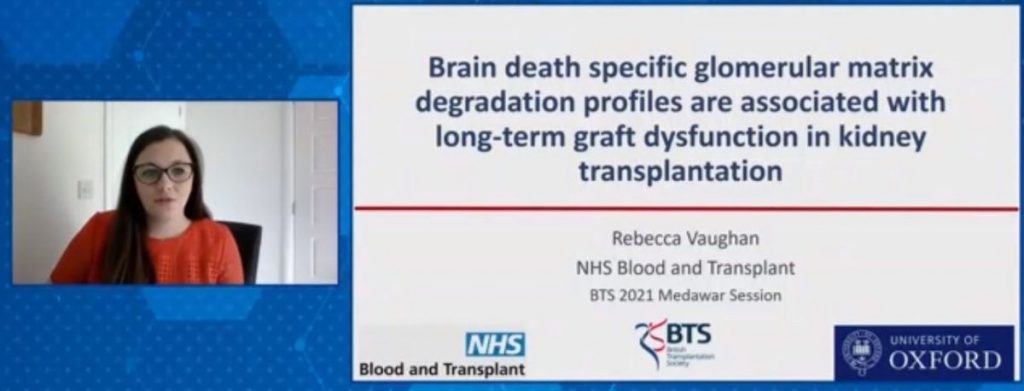by Rebecca Vaughan
This year, as has become our new norm, the BTS Congress 2021 was hosted using an online platform, allowing delegates to experience interactive plenary sessions and parallel sessions similar to when attending the conference. However unique to the online experience was the opportunity to access content ‘on-demand’, including the additional option to listen to pre-recorded abstract talks, at a time that suits you. Although, many were saddened by the lost opportunity to meet with colleagues and friends, the commitment from BTS to provide an opportunity for clinicians and researchers to gather and share their research from the last 12-months was an absolute success and credit to the organisers.

For this conference, I submitted an abstract titled ‘Brain death specific glomerular matrix degradation profiles are associated with long-term graft dysfunction in kidney transplant’ on behalf of our teams at NHSBT and the Oxford Transplant research lab in University of Oxford. This abstract was selected for presentation as part of the ‘Medawar Award Session’, where my abstract and presentation was considered for the award along with three other researchers who also submitted abstracts for basic science in transplantation. I feel incredibly fortunate to have had our abstract considered for the Medawar award, and was excited to highlight how we have utilised invaluable samples from the QUOD biobank. Our research utilised 60 kidney biopsies from the QUOD biobank from both DBD and DCD donors. Our work described a DBD specific degradation profile for cytoskeletal proteins in donor kidneys that linked to suboptimal 12month posttransplant function. Our research was considered novel in that it indicates that protein degradation may affect donor kidneys and post-transplant function. Preparing for my live presentation was also a memorable experience, involving many rehearsals with my supervisors Dr Kaisar and Prof Ploeg and colleagues, many adjustments and changes before the final live talk.
Our group also had a second opportunity to present our research work involving the analysis of QUOD samples. A second abstract titled ‘Protein profiles in deceased donor kidneys associated with 12-Month post-transplant kidney function’ was accepted as a pre-recorded talk, presented by our colleague Priyanka Joshi. This study utilised 185 kidney biopsies from the QUOD biobank for proteomic analysis, comparing DBD and DCD donors with differing functional outcomes 12mth posttransplantation. This study showed that protein markers in donor kidneys associate to posttransplant outcomes and indicate which biological pathways may play a role in determining the donor kidney quality.
Our research work has highlighted the value of the QUOD samples; based on the collection protocols, these samples provide us with confidence regarding sample quality and collection continuity. Importantly, our sample selection and analysis is linked with the clinical and demographic metadata that we receive from the National Transplant Registry from NHSBT. The combination of the selection of QUOD samples and donor and recipient metadata makes a unique research resource.
The overarching focus of the BTS congress was the impact of COVID-19 on transplantation, with NHSBT statistics team highlighting changes in trends of donation and transplantation due to the pandemic. An invited keynote speaker focused on ‘resilience’ encouraging people to reflect on their own resilience and how they have adjusted to the inevitable changes that have come along with a global pandemic, whilst looking to the future with reasonable caution but also excitement. Several talks also touched on emerging perfusion technologies and the improvements they may have on outcomes in the future, and evaluating single centre experiences.
Overall the BTS Congress 2021 was a great success despite the mammoth task of moving the conference to an online platform. The opportunity to bring together scientists and clinicians to discuss research, trends and experiences in transplantation is essential to moving the field forward. The conference provided an excellent opportunity to showcase research work, however the opportunity to interact with each other; ask questions, discuss and debate ideas was lacking and greatly missed. The representation of QUOD, NHSBT and the University of Oxford was strong, and hopefully more researchers were inspired to consider QUOD samples for their ongoing work.
Congratulations to Charlotte Brown (Wales Kidney Research Unit) and Maria Ibrahim (NHSBT Bristol) who were awarded the 2021 Medawar Medals at the congress. Click here to read about their research.
